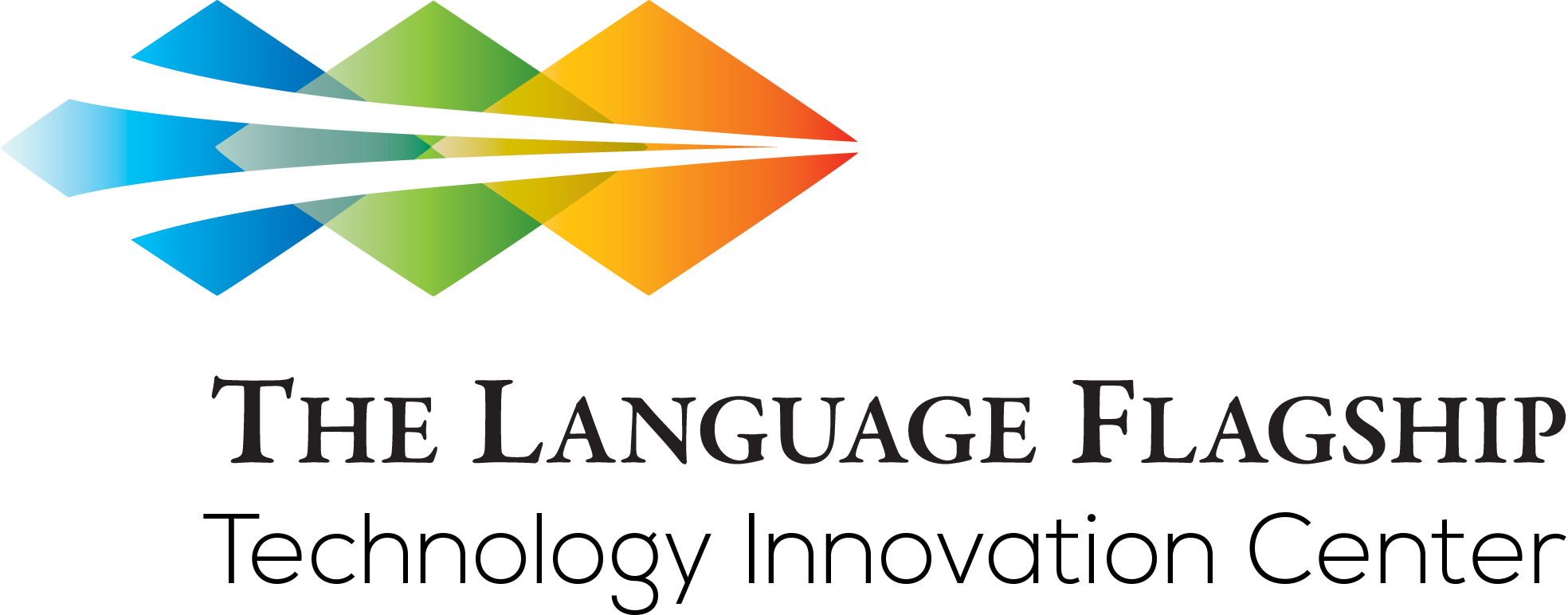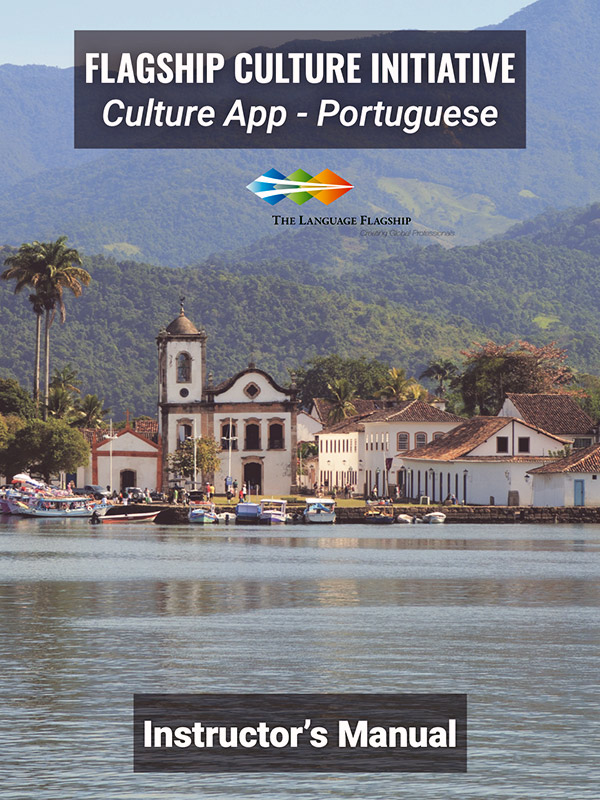
CULTURE App
Culture Initiative
BRAZILIAN PORTUGUESE
Brazilian Portuguese Scenarios
The materials presented in the Brazilian Portuguese modules allow the user to experience interactive simulated scenarios that examine elements of Brazilian culture. The scenarios also challenge the user to think about and discuss methods for responding to everyday situations that one may encounter in Brazil, using cues from the narrative and contextual information provided. Each case consists of a context chart that sets up the narrative, or vignette. It is in the latter section that the user will be presented with a chain of events, which results in a cultural misunderstanding or inappropriate response. After reviewing all the contextual information, the user is given anywhere between four to six options that attempt to provide an explanation as to what went wrong, what action should have taken place, what actions could still be used to improve the situation’s outcome, and what actions to avoid. The judgement tasks in each scenario were rated by a panel of scholars, both Brazilian and non-Brazilian, who are highly familiar with Brazilian culture and the Portuguese language. The actual rating that corresponds to each judgment task is a range from all feedback received. A small range indicates greater agreement among the panelists, while a wider range indicates expanded perspectives.
Before using the materials, it is important to note that the focus of each situation should not be on finding the “right” or “wrong” answer. Although judgement tasks are rated on a numerical scale indicating acceptability (0 being the least appropriate response and 5 being the most appropriate response), you might also think of this in terms of “more culturally appropriate” or “less culturally appropriate” responses, or even “more constructive” or “less constructive” responses.
Due to the non-binary nature of culture, the judgement tasks and associated ratings are meant to serve as a jumping off point to generate conversation and discussion about varying perspectives. While some situations presented are mostly straightforward, others may not have a clear or precise answer. Some may have multiple methods of approach. It is also useful to take into account additional nuances in the context that may even change the whole outcome or course for dealing with a situation in a culturally appropriate manner. For example, the response to a scenario may depend on several variables, which could alter the way one would handle the situation, such as who is the person performing an action, elements related to time, mode of communication, etc. These, along with many other factors, can all influence the way to successfully manage the outcome of a scenario. By changing even one of these elements, a different result may be the consequence.
By eliminating the focus on finding the “right” or “wrong” answer, these materials aim to generate discussion centered on the implications of each possibility. Culture is subjective in nature, so it is beneficial for the instructor to also weigh in and explain their viewpoint, especially if it is different from the one presented in these materials. In the end, the scenarios are tools to increase pragmatic knowledge, intercultural competence, greater dialogue and overall awareness. Reflecting on the experience, whether it be lived or hypothetical, is essential to strengthen one’s intercultural abilities. To further contextualize the events taken place, all scenarios provide cultural notes after the judgment task as an additional resource, and many conclude with language notes and reflection tasks that can be used for guided discussion and further expansion on the topic in the classroom. These scenarios are intended to be useful in a variety of instructional contexts that include different proficiency levels, previous cultural knowledge, pre-departure orientations and post-study abroad reflection, face-to-face and online delivery, as well as sessions in which role-play and other performative tasks are employed to engage these cultural issues.
Acknowledgements
Brazilian Portuguese Project Lead
Joseph Bass, University of Maryland
Brazilian Portuguese Project Affiliate
Adonis de Carvalho Borges, University of Maryland
Principal Author
Joseph Bass, University of Maryland
Co-Authors
Adonis de Carvalho Borges, University of Maryland
Viviane Klen-Alves, University of Georgia
Project Consultants
Viviane Klen-Alves, University of Georgia
Robert Moser, University of Georgia
Content Reviewers
Joseph Bass, University of Maryland
Adonis de Carvalho Borges, University of Maryland
Orlando R. Kelm, University of Texas at Austin
Viviane Klen-Alves, University of Georgia
Robert Moser, University of Georgia
Translations into Portuguese
Adonis de Carvalho Borges, University of Maryland
Ratings Panelists
Joseph Bass, University of Maryland
Adonis de Carvalho Borges, University of Maryland
Fernanda Guida, University of Pennsylvania
Viviane Klen-Alves, University of Georgia
Débora Zamorano, University of Texas at El Paso
Data Analysts
Joseph Bass, University of Maryland
Adonis de Carvalho Borges, University of Maryland
Data and Content Entry
Joseph Bass, University of Maryland
Adonis de Carvalho Borges, University of Maryland
Dmitrii Egorov, University of Hawai‘i at Mānoa Language Flagship Technology Innovation Center
Denis Melik Tangiyev, University of Hawai‘i at Mānoa Language Flagship Technology Innovation Center
Stephen L. Tschudi, University of Hawai‘i at Mānoa Language Flagship Technology Innovation Center
Tian Wang, University of Hawai‘i at Mānoa Language Flagship Technology Innovation Center
Images and Graphic Design
Julio C. Rodriguez, University of Hawai‘i at Mānoa Language Flagship Technology Innovation Center
Modules
Public and Private Spaces
Food and Eating Out
I embarrassed myself, but what did I do wrong?
Hey! You overcharged me!
Spatial Awareness
You want to go WHERE???
Well, this is awkward….
When Partying Becomes a Dilemma
Why can’t I check out here?
Social Awareness
“First in Flight”
I don’t work here, sir.
Lifestyle and Greetings/Gestures
Going with the Flow
I’m almost there!
There is no way I’m wearing that!
Are we shopping or “passeando”? Maybe I should say something?
Is now a bad time?
Greetings, Gestures, and Showing Affection
Did I just offend grandma?
Why did you have to make things weird?
What did you call him?!?!
You’re my boyfriend, so start acting like it!
Should I stay or should I go?
Celebrations and Traditions
Have I just eaten the saint’s food?
French exit, not so much.
The Flagship Culture Initiative was supported by a 3-year grant (2017-2020) to the University of Maryland from the Institute of International Education (IIE), acting as the administrative agent of the National Security Education Program (NSEP), Defense Language and National Security Education Office (DLNSEO) for The Language Flagship.
The Language Flagship is a national initiative to change the way Americans learn languages through a groundbreaking approach to language education through a network of programs at institutions of higher education across the United States. The Language Flagship graduates students who will take their place among the next generation of global professionals, commanding a superior level of proficiency in one of ten languages critical to U.S. national security and economic competitiveness.
This website has been developed and is maintained by The Language Flagship Technology Innovation Center. The content of this website and of the Culture App do not necessarily reflect the position of policy of the U.S. government. No official government endorsement should be inferred.

